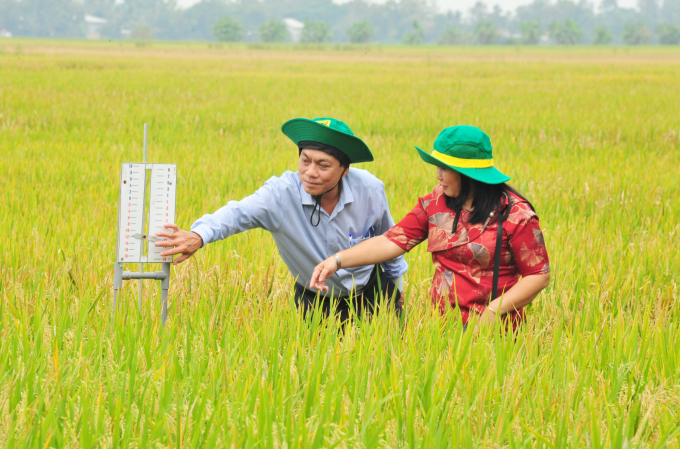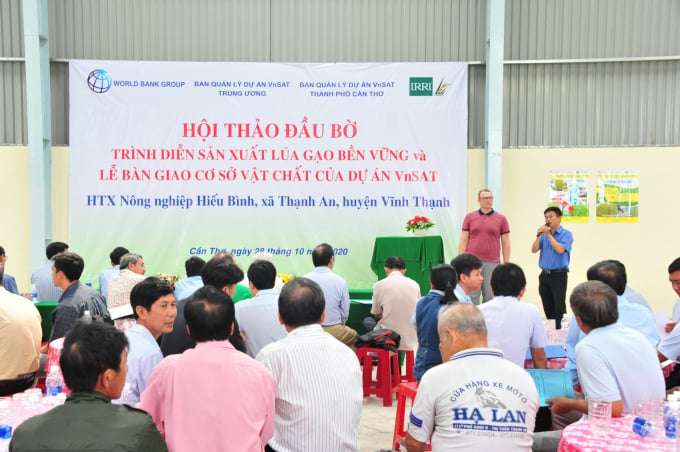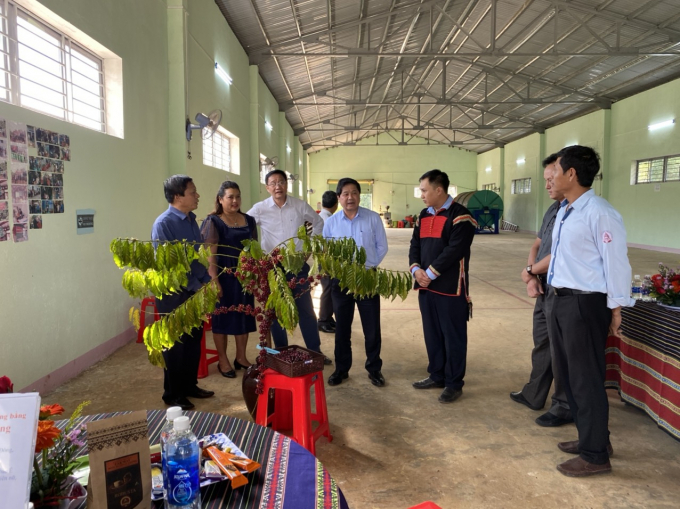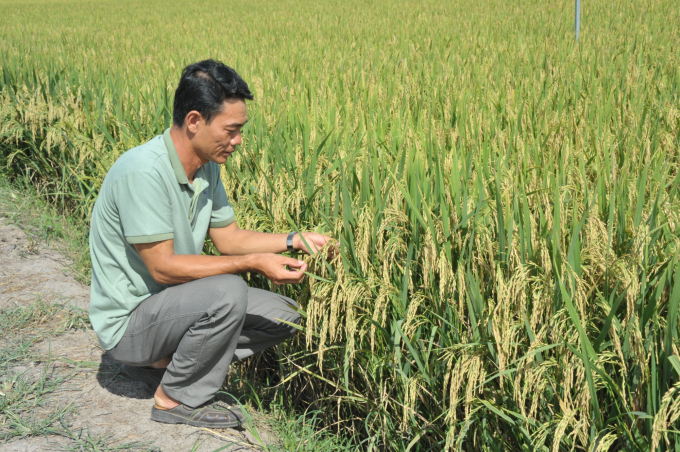May 21, 2025 | 06:29 GMT +7
May 21, 2025 | 06:29 GMT +7
Hotline: 0913.378.918
May 21, 2025 | 06:29 GMT +7
Hotline: 0913.378.918

All the targets of the VnSAT project have met and exceeded the initial project goals. Photo: HA.
Mr. Nguyen Do Anh Tuan, Director of International Cooperation Department (Ministry of Agriculture and Rural Development) affirmed: “In the implementing the VnSAT project, there have been very specific and drastic leadership and direction of the leaders. The Ministry of Agriculture and Rural Development, working closely with localities, businesses, and cooperatives, has made a huge transformational impact on the coffee industry in the Central Highlands as well as the rice industry in the Mekong Delta.
By now, all the targets of the VnSAT project have met and exceeded the initial project goals.
Specifically, the targets are on applying new farming methods to help reduce production costs, reduce input costs, reduce resource use in agriculture, and increase people's incomes.
The VnSAT project has changed people's farming practices, in which two contents are showing that the role of VnSAT is very clear.
The first is to help reduce input costs, improve the competitiveness of the agricultural sector, help farmers achieve the necessary added value, and increase income from rice and coffee. For example, reducing varieties, reducing fertilizers, reducing pesticides in rice production in the Mekong Delta, reducing water use, chemicals, and other input costs in coffee production in the Central Highlands...
Secondly, the VnSAT project has made an important contribution to helping farmers, cooperatives, and enterprises produce more standard and quality agricultural products to overcome the technical barriers required by importing countries.

Farmers participating in the VnSAT project can access many introductory seminars to disseminate production technology and infrastructure. Photo: HA.
Simultaneously with the support from VnSAT, rice and coffee products have also met the increasing demands of domestic and international consumers.
Regarding the implementation of international projects in the coming time, the Ministry of Agriculture and Rural Development is coordinating with localities to prepare new international projects to support the process of restructuring agriculture, building new countryside according to new goals".
Up to now, the VnSAT project has achieved and exceeded the goals. Specifically, about the PD01 index, a total of 966,771 people benefited, reaching 120.8% of the target at the end of the period (800,000 people).
Regarding PDO2 index (area applying advanced farming processes): For rice, 175,442 hectares of rice have properly applied sustainable farming processes, reaching 117% of the target at the end of the period (150,000 hectares); for coffee, 66,129 hectares of coffee have properly applied the sustainable coffee farming/replanting process, reaching 132.3% of the target at the end of the period (50,000 hectares).

Deputy Minister of Agriculture and Rural Development Le Quoc Doanh visits a coffee processing facility supported by the VnSAT project in the Central Highlands. Photo: LT.
Meanwhile, the PDO index 3 (increasing profits per 1 hectare of productive land of farmers participating in the project compared to those outside the project): For rice, the average profit/hectare increased by 28.6% compared to that of the households outside the project. If compared with before the project, the average profit increased by 32% (data of the 2020-2021 winter-spring crop), reaching 107% compared to the target at the end of the period of 30%; For coffee, the average comparative profit increased by 23% (the 2020 - 2021 coffee year compared to 2015-2016 coffee crop), reaching 114.9 % compared to the end target.
On reducing greenhouse gas emissions (PDO4 index): 1,492,636 tonnes, reaching 149.3% compared to the year-end target of 1,000,000 tonnes (using the EX-ACT tool).
Regarding the PDO 5 index, the assessment results in 2020 show that all 4/4 units and 10/10 selected provinces have significantly improved public service quality compared to the first assessment (2016 - 2017), of which 3/4 units of the Ministry of Agriculture and Rural Development had a marked improvement and reached over 80%, there was 1 unit (National Agricultural Extension Center) improved to a lesser extent (reaching 67 %); 10/10 provinces have significantly improved service quality compared to the first time (all over 70%, average 82%).
In the provinces of the Mekong Delta, the rice area applying sustainable farming processes, assessed through two criteria of pesticides and fertilizers, has 203,992 hectares of rice applying these two criteria, compared to the target of 150,000 hectares at the period end.

The VnSAT project has created a remarkable change for the Mekong Delta. Photo: LT.
For the coffee area applying sustainable farming methods assessed through reducing pesticides and fertilizers (intermediate index C1), the area under cultivation has reached 50,721 hectares, compared with the target of 40,000 hectares at the end of the period; the replanting area is 17,046 hectares, compared with the target of 10,000 hectares at the period end; the coffee area applying water-saving irrigation method (intermediate index C2) is 54,707 hectares, compared with the target of 22,000 hectares at the end of the period; the area of coffee replanting using certified varieties in the project area (intermediate index C3) is 21,574 hectares, compared with the target of 7,000 hectares at the end of the period.
The VnSAT project has supported some farmer organizations to invest in infrastructures such as warehouses, drying yards, and coffee processing machinery and equipment to improve the coffee products of farmers' organizations. high productivity and quality, meeting the business and export needs of enterprises. Thereby forming a chain of links in the coffee industry from production to consumption towards long-term sustainability.
Up to now, most of the organizations and individuals producing coffee in the project area have links with coffee purchasing, processing, and exporting enterprises such as Ea Kmart - Hoa Dong cooperative (Krong Pac district). affiliated with DAKMAN Vietnam Co., Ltd; Ea Tan Cooperative (Krong Nang District) associated with Import-Export Company 2-9 (SIMEXCO); Quyet Tien Cooperative (Cu M'gar district) affiliated with Dak Lak Import-Export Investment Joint Stock Company (INEXIM).
Translated by Ha Phuc

(VAN) Japan's grant aid project contributes to capacity building, promoting organic agricultural production, and fostering sustainable community development in Dong Thap province.

(VAN) For years, the CRISPR-Cas9 genome technology has been reshaping genetic engineering, a precision tool to transform everything from agriculture to medicine.

(VAN) Vietnam aims to become a 'leader' in the region in the capacity and managing effectively soil health and crop nutrition.
![Reducing emissions from rice fields: [Part 1] Farming clean rice together](https://t.ex-cdn.com/nongnghiepmoitruong.vn/608w/files/news/2025/05/05/z6509661417740_a647202949c539012a959e841c03e1d3-nongnghiep-143611.jpg)
(VAN) Growing clean rice helps reduce environmental pollution while increasing income, allowing farmers to feel secure in production and remain committed to their fields for the long term.
/2025/05/19/5136-1-144800_230.jpg)
(VAN) The Nghe An Provincial People's Committee has just approved the list of beneficiaries eligible for revenue from the Emission Reductions Payment Agreement (ERPA) in the North Central region for the year 2025.

(VAN) 14 out of 35 domesticated elephants in Dak Lak province have had their living conditions improved, with 11 of them currently participating in the non-riding elephant tourism model.

(VAN) Muong Nhe Nature Reserve hopes that being upgraded to a national park will lay the foundation for forest protection efforts to be carried out in a systematic, modern, and sustainable manner.